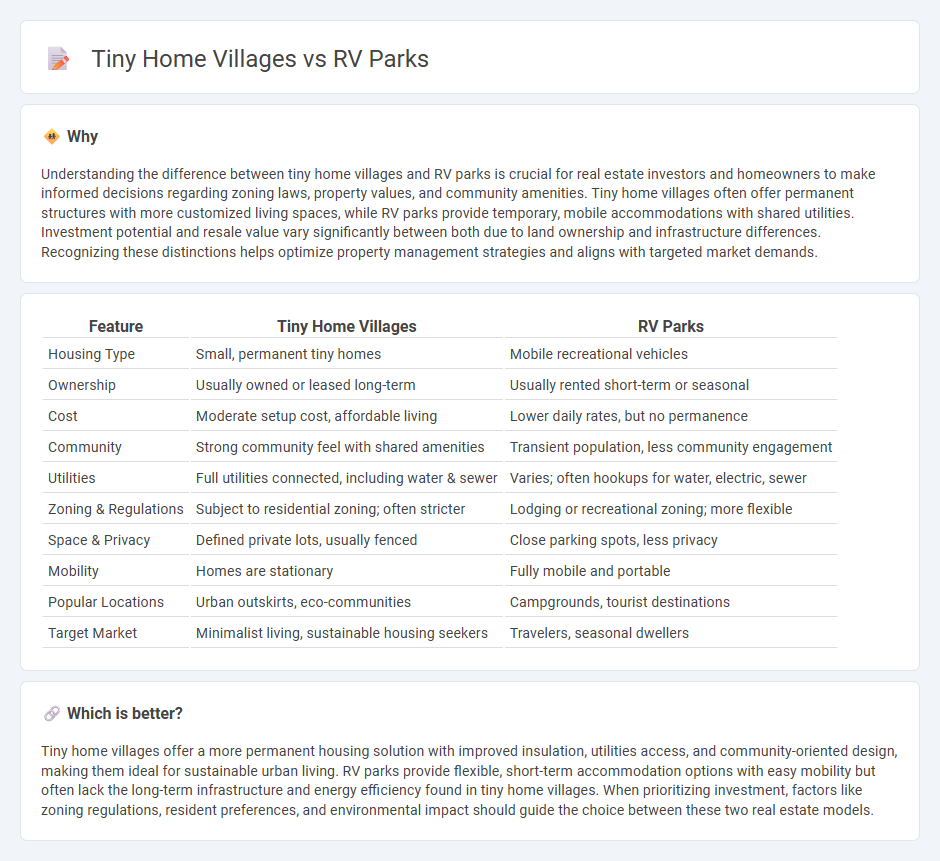
Tiny home villages offer affordable, sustainable living solutions with permanent structures and community-focused amenities, contrasting with RV parks primarily designed for transient stays and mobile accommodations. These villages emphasize eco-friendly designs and long-term residency, while RV parks cater to short-term travelers seeking flexibility and convenience. Explore the advantages of both to determine the ideal option for your lifestyle and investment goals.
Why it is important
Understanding the difference between tiny home villages and RV parks is crucial for real estate investors and homeowners to make informed decisions regarding zoning laws, property values, and community amenities. Tiny home villages often offer permanent structures with more customized living spaces, while RV parks provide temporary, mobile accommodations with shared utilities. Investment potential and resale value vary significantly between both due to land ownership and infrastructure differences. Recognizing these distinctions helps optimize property management strategies and aligns with targeted market demands.
Comparison Table
| Feature | Tiny Home Villages | RV Parks |
|---|---|---|
| Housing Type | Small, permanent tiny homes | Mobile recreational vehicles |
| Ownership | Usually owned or leased long-term | Usually rented short-term or seasonal |
| Cost | Moderate setup cost, affordable living | Lower daily rates, but no permanence |
| Community | Strong community feel with shared amenities | Transient population, less community engagement |
| Utilities | Full utilities connected, including water & sewer | Varies; often hookups for water, electric, sewer |
| Zoning & Regulations | Subject to residential zoning; often stricter | Lodging or recreational zoning; more flexible |
| Space & Privacy | Defined private lots, usually fenced | Close parking spots, less privacy |
| Mobility | Homes are stationary | Fully mobile and portable |
| Popular Locations | Urban outskirts, eco-communities | Campgrounds, tourist destinations |
| Target Market | Minimalist living, sustainable housing seekers | Travelers, seasonal dwellers |
Which is better?
Tiny home villages offer a more permanent housing solution with improved insulation, utilities access, and community-oriented design, making them ideal for sustainable urban living. RV parks provide flexible, short-term accommodation options with easy mobility but often lack the long-term infrastructure and energy efficiency found in tiny home villages. When prioritizing investment, factors like zoning regulations, resident preferences, and environmental impact should guide the choice between these two real estate models.
Connection
Tiny home villages and RV parks share a common focus on affordable, flexible living spaces that appeal to individuals seeking minimalist lifestyles or temporary housing solutions. Both offer community-oriented environments with shared amenities, fostering social interaction among residents while reducing costs compared to traditional housing. This connection enhances accessibility to alternative living options, addressing urban housing shortages and promoting sustainable development trends in real estate.
Key Terms
Zoning Regulations
Zoning regulations play a critical role in differentiating RV parks and tiny home villages, as RV parks often fall under recreational or transient use categories, while tiny home villages typically require residential zoning classification. Many municipalities enforce strict density limits, minimum lot sizes, and specific utility hookups, impacting the feasibility of permanent tiny home communities compared to RV parks designed for temporary stays. Discover the detailed zoning codes and compliance strategies that influence the development and operation of both RV parks and tiny home villages.
Infrastructure Requirements
RV parks typically require robust utility hookups including water, electricity, and sewage systems designed to accommodate large, mobile units, along with spacious roads and parking areas. Tiny home villages demand more permanent infrastructure such as sewer connection lines, solid foundations, and adherence to local zoning laws that can complicate development but ensure long-term stability. Explore the crucial infrastructure distinctions to determine which living option best suits your investment and lifestyle plans.
Lease Agreements
Lease agreements in RV parks typically offer short-term flexibility with weekly or monthly options, making them ideal for travelers seeking temporary stays. Tiny home villages often provide longer-term leases resembling traditional residential contracts, emphasizing community rules and maintenance responsibilities for permanent or semi-permanent residents. Explore more about lease terms and legal considerations to choose the best living arrangement for your lifestyle.
Source and External Links
Washington RV Parks | RV Campgrounds in WA - Offers a collection of private RV parks across Washington State, highlighting scenic locations like Bellingham and Leavenworth.
Lake Pleasant RV Park - Located in Bothell, WA, this resort offers deluxe amenities and full hookup RV sites near Seattle.
Forks RV Park - A pet and family-friendly campground in Forks, WA, ideal for exploring Olympic National Park.
 dowidth.com
dowidth.com